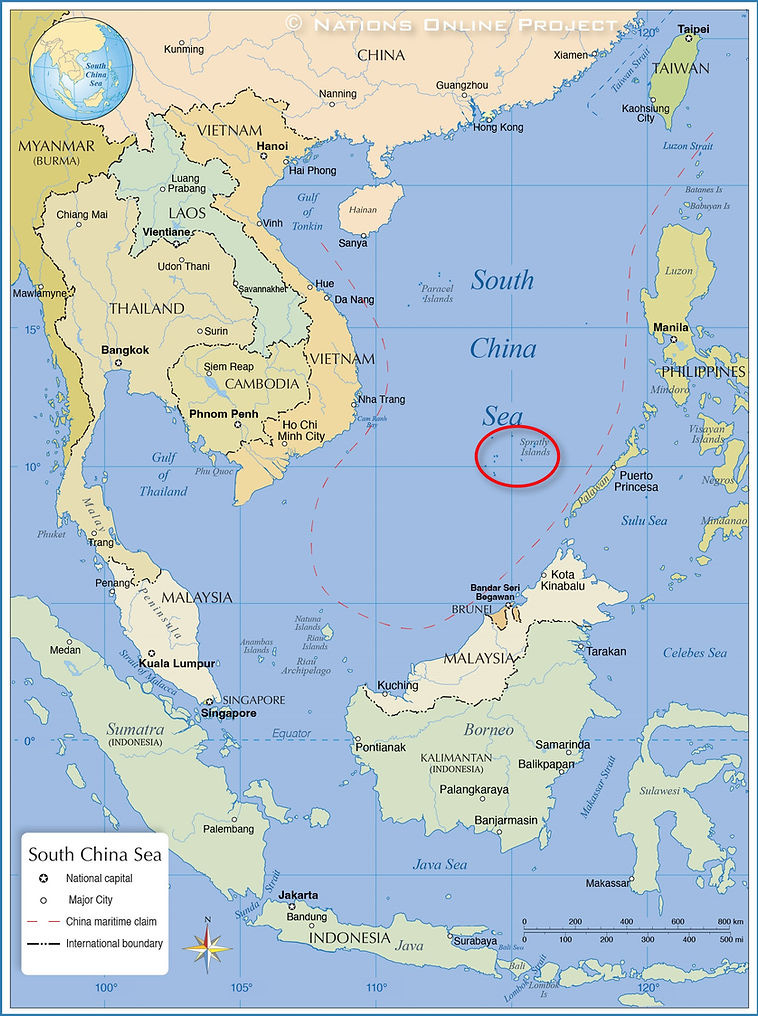
Expansionist China: Under Xi Jinping, China is conquering the South China Sea. He has taken barren scraps of reefs and rocks in the Spratly Archipelago and built them into huge fortified military outposts which he claims as sovereign Chinese territory. So why should the United States care?
Because the South China Sea is among the most strategically and economically critical waterways on the planet. As ABC noted, “In addition to over 10 percent of the world's fish catch coming from the South China Sea each year, it's estimated 11 billion barrels of oil and 190 trillion cubic feet of natural gas lie beneath its waters. About one-fifth of the world's trade flows through the South China Sea.”
Traditionally, the SCS has been considered international waters. After all, it covers 265,000 square miles, and is ringed by several countries including the Philippines, Vietnam, Malaysia, Brunei, and Taiwan. The SCS is not “owned” by any nation. That’s a global agreement which Xi wants to upend.
Global hotspot: The Spratlys. The Spratly Island archipelago consists of 14 islands plus 100+ smaller reefs and outcroppings. But thanks to their geography, they sit in a controlling strategic position over the entire South China Sea. One of the Spratly Islands is 22 miles from the Philippines; another is only six miles from Vietnam's territory. The nearest Chinese island is 600+ miles away.

But, Xi is no dummy. He sees the importance of these islands, so he used his military to grab them and proclaim them to be owned by China. They then engaged in a massive landfill operation to enlarge several of the islands. Once they had enough landmass, China built runways, air bases, ports, and military forts on them. And now Xi is using those islands he built to claim territorial governance over most of the entire SCS.
Much of the world stands on the side of international law, thus oppose China’s unprecedented thefts. The Permanent Court of Arbitration ruled in favor of the Philippines in their efforts to stop China; Xi simply ignored the rulings and persisted with his takeovers. Vietnam and most of the other SCS nations have also complained.
China blew them off. OTDI 2017, China made their military intentions in the SCS abundantly clear. They flight-tested four of their new DF-26 missiles in Inner Mongolia as part of a simulated strike on a U.S. missile defense. An antiship variant of the missile was tested in the South China Sea, reportedly striking a moving ship. China was broadcasting to the world their capabilities and threats.
So, Trump to the rescue! After all, during his 2016 campaign, Trump informed our voters: We “can't continue to allow China to rape our country … We have the cards. We have a lot of power with China." And, one of Trump's favorite ways to insult Democrats is to call them "Communists." So when faced with actual Communists, in Red China, presumably Trump knows exactly what to do, right? And btw, the Chinese construction projects had begun during the Obama Administration, and Trump loves nothing more than to one-up his predecessor. So, here's his big chance.
But, once he took power, Trump...reversed course. He started playing the role of subservient partner in this relationship. He started calling Xi “a terrific guy,” saying that he’s “a very special person.” So perhaps it’s no surprise that Trump declined to support Vietnam’s claims, signaling Xi that the U.S. won’t raise a fuss about Chinese expansion. (This raises echoes of Trump's acquiescence to Xi re building detention camps for the Uyghurs)
His decision prompted Foreign Policy to conclude that Trump “lost the South China Sea.”
U.S. Navy Admiral Philip Davidson recently concluded that China is “now capable of controlling the South China Sea in all scenarios short of war with the United States.”
Trump’s virtual capitulation gained no goodwill from Xi, as Trump’s policies were a “sledgehammer” which created damage that “won’t be undone easily,” according to international relations expert Hui Feng.
From the start of his reign in 2012, Xi Jinping has spoken of the “Chinese dream,” to “restore” the nation’s historical influence. To this end, Xi vowed to complete China’s transformation into a fully developed great power by 2049. Being permitted to have his way in the South China Sea is a great start.
Dive Deeper
ABC reviewed the importance of the South China Sea
The Guardian explains the SCS competition
The Pacific Council analyzed China’s military expansion
The CSIS Missile Threat Project describes the Chinese DF-26
Australia Broadcasting Company explains Trump’s “very special friendship” with Xi
Foreign Policy’s analysis of how Trump lost the South China Sea
Hui Feng’s “sledgehammer” verdict published in The Conversation




